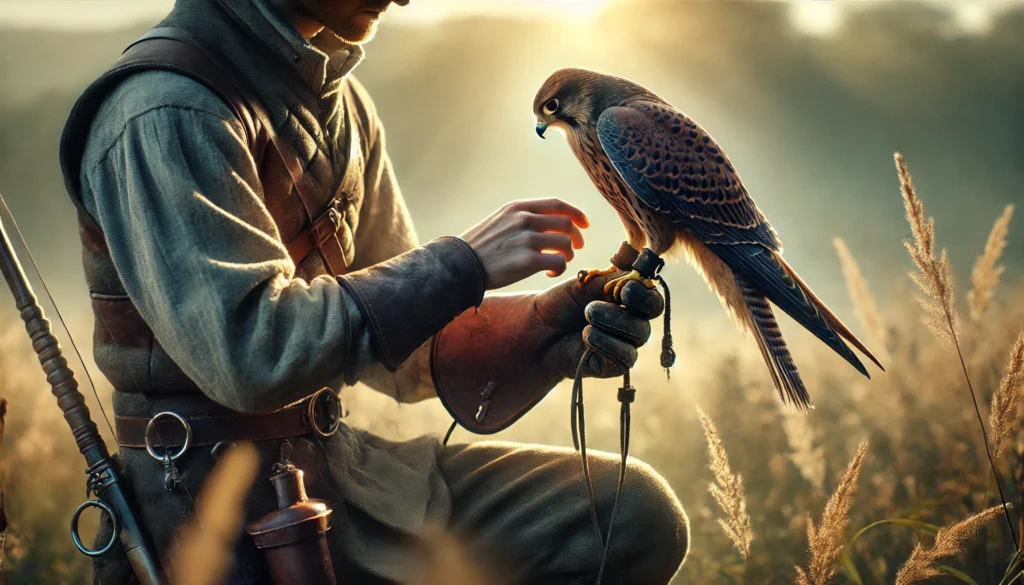Preparing for Falconry Competitions
- Understanding Falconry: Learn about the art of hunting with trained birds of prey.
- Selecting a Bird: Choose the right bird for competitions, like falcons or hawks.
- Training Your Bird: Spend time training your bird in hunting, flying, and responding to commands.
- Health and Nutrition: Ensure your bird is healthy with a balanced diet and regular veterinary check-ups.
- Equipment: Have the necessary gear, such as hoods, jesses, and telemetry equipment.
- Practice Flights: Regularly schedule training flights to mimic competition scenarios.
- Handling Skills: Improve your skills in handling and interacting with your bird.
- Competition Rules: Familiarize yourself with the rules and guidelines of different falconry competitions.
- Weather Awareness: Keep an eye on the weather, as it affects flight conditions and bird behavior.
- Safety First: Always prioritize the safety of both you and your bird to prevent injuries.
- Join a Community: Engage with other falconers to share tips, experiences, and support.
Follow these steps, and you’ll be well-prepared for a successful falconry competition journey. Good luck!
Mastering Falconry Competitions: A Journey to Success
Welcome to the fascinating world of falconry, where the bond between human and bird is unlike anything else. Here at Learn Falconry, we’re not just passionate about teaching you the intricate skills of this ancient art; we also want to help you thrive and shine in falconry competitions.
In this article, we will walk you through the essential preparations for falconry competitions. We’ll cover key aspects, from understanding the rules of the game to building the ultimate partnership with your raptor. Plus, we’ll share tips on how to keep your bird in peak condition and how to stay focused even under pressure.
Stay with us, and you’ll discover not only how to prepare for competitions but also why these challenges can be incredibly rewarding. Let’s embark on this journey together and make your next falconry competition a triumph that you and your bird will cherish forever!
Tips and Techniques for Preparing for Falconry Competitions
Preparing for falconry competitions requires dedication, knowledge, and specialized training. These contests test the skills of both the falconer and their bird, making thorough preparation essential. Here are some key steps and insights to help you get ready for your next falconry competition.
Falconry Training: Building a Strong Foundation
The core of any successful competition preparation lies in effective falconry training. It’s crucial to start with basic techniques and gradually move to more advanced methods as your falcon grows more experienced. Some essential aspects of falconry training include:
- Basic Training Techniques: Establishing trust and clear communication between you and your falcon is the first step. Learn more here.
- Advanced Training Methods: As your falcon progresses, incorporate advanced training to hone their hunting and flying skills. Explore advanced techniques here.
- Positive Reinforcement Techniques: Consistent and positive reinforcement helps in maintaining your bird’s motivation and cooperation. Get tips on positive reinforcement here.
Preparing for Contests: Essential Steps and Considerations
Competing in falconry contests involves careful planning and attention to detail. Here are some key steps to take when preparing for contests:
- Understanding the Rules: Each competition may have different rules and regulations. Make sure to review and understand them thoroughly to ensure compliance and know what judges will evaluate.
- Specialized Falconry Equipment: Using the right tools can significantly enhance your performance. Familiarize yourself with various falconry equipment here.
- Health and Nutrition: A healthy falcon performs better. Regular health check-ups and a balanced diet are crucial. Learn how to maintain your falcon’s health here.
Falconry Competition Prep: Training Routines and Techniques
The competition prep process focuses on refining your falcon’s abilities and ensuring they are at peak performance on the competition day. Key activities include:
- Conditioning and Fitness Training: Just like athletes, falcons need conditioning to build stamina and strength. Develop an effective fitness plan here.
- Training for Competitions: Tailor your training sessions to mimic competition scenarios. Specific techniques can be found here.
- Behavioral Training Techniques: Address any behavior issues and ensure your falcon responds well in the competition environment. Explore behavioral techniques here.
The Right Falcon: Selecting and Nurturing
Choosing the right falcon for competitions is crucial. Different species have unique traits that might align better with specific types of contests. To explore more about different species, visit here.
When preparing a falcon for competition, consider the following:
- Basic Care and Health Maintenance: Ensure your falcon’s well-being by providing a proper diet, regular health check-ups, and a stress-free environment. Basic care tips can be found here.
- Choosing a Suitable Falcon: Not all falcons are born champions. Selecting a species that matches your skill level and training style is vital. Learn more about choosing your first falcon here.
Practical Tips and Final Preparations
As the competition day approaches, focus on fine-tuning your routine and ensuring all preparations are complete. Some practical tips include:
- Equipment Check: Ensure all your equipment is in top condition. Have a checklist ready and check your gear thoroughly ahead of time.
- Mock Competitions: Simulate the competition environment to acclimate your falcon to the stress and routine of the actual event.
- Mental Preparation: Your mindset impacts your falcon’s performance. Stay calm, patient, and confident throughout the process.
For more detailed guidance and advanced tips on preparing for falconry competitions, explore further here.
By following these steps and utilizing the resources provided, you can ensure a well-prepared and successful falconry competition experience. Happy training, and may your next contest be a soaring success!
Dive Into Falconry Competition Preparation
Falconry Regulations and Permits
Preparing for falconry competitions involves understanding and adhering to strict regulations. Here are some aspects to keep in mind:
Falconry Exam:
- Administered by: ODNR, Division of Wildlife
- Format: 100 multiple-choice questions
- Passing Grade: 80%
- Exam Fee: $75, includes a three-year permit
Sponsorship:
- Requirement: Sponsor who is either a general or master class falconer
- Information Source: Ohio Falconry Association
Permit Information:
- Falconry Permit: Valid for three years; fee combined with exam fee at $75
- Raptor Capture Permit: Needed to acquire your first bird; issued alongside the falconry permit
Falconry Levels
- Falconry Stages:
- Apprentice: Initial stage with specific requirements
- General: Intermediate stage after apprentice, allows possession of more birds
- Master: Advanced stage, with the highest number of birds allowable under the law
Competitions
- Competitions Hosted by Abu Dhabi Falconers Club:
- President Cup Falcon Competition
- Alyasat Falcons Competition
Essential Training and Daily Care
Falconry training is fundamental and requires a dedicated approach:
- Daily Care: Includes feeding, health checks, and exercise
- Training for Wild Game: Falcons are trained to help with hunting in place of firearms
Compliance and Regulations
- Regulatory Bodies: ODNR, Division of Wildlife; U.S. Fish and Wildlife Service
- Regulations Include:
- Raptor Identification and Care
- Health Standards
- Training Protocols
License Types and Training Facilities
Registration and Exam Details
- Registration Deadline: April 10, 2024
- Exam Date: April 12, 2024
- Exam Duration: 2 hours, with no fee
License Types
Apprentice:
- Age Requirement: 14 years
- Exam Requirement: Pass with a score of 80% or higher
- Additional Requirement: Current year hunting license
General:
- Age Requirement: 18 years
- Experience: Minimum of 2 years as an apprentice
- Summary Requirement: Written documentation of raptor maintenance experience
Master:
- Age Requirement: 18 years
- Experience: Minimum of 5 years as a general falconer
- Approval: Written recommendations from three master falconers and approval from the NYS Falconry Advisory Board
Training and Facility Requirements
Falconry Training:
- Training under a master or general falconer
- Focus areas: Handling, nutrition, flying techniques
Facility Requirements:
- Mews: Indoor housing for birds
- Weathering Area: Outdoor area for birds to acclimate
Cost and Duration
- Falconry License Fee: $40
- License Validity: 5 years
Seasonal and Course Information
- Falconry Hunting Seasons: Vary by state and region
- Training Courses:
- Group and individual sessions
- Topics include: History of falconry, equipment, handling, hunting theory
Supporting Data and Resources
- Table: Overview of Falconry Stages and Requirements
| Stage | Age Requirement | Experience Required | Maximum Birds Allowed | Training & Exam Requirements |
|---|---|---|---|---|
| Apprentice | 14 years | None | 1 | Pass exam, current year hunting license |
| General | 18 years | 2 years as apprentice | Increased from apprentice | Pass additional written summary describing raptor maintenance |
| Master | 18 years | 5 years as general | Maximum allowed under law | Recommendations from three master falconers, advisory board approval |
Wrapping Up Your Falconry Competition Experience
Preparing for falconry competitions involves several critical steps and dedication to ensure success. First, passing the falconry exam with a score of at least 80% and obtaining the necessary permits are fundamental. It’s essential to find a sponsor who can guide you through the process, especially if you’re just starting. The falconry journey progresses through three stages: apprentice, general, and master, each with its own requirements and restrictions on the number of birds you can own.
Daily training and care for your raptors are crucial, as is understanding and following regulations set by wildlife authorities. Falconry competitions, hosted by clubs like the Abu Dhabi Falconers Club, provide an excellent opportunity to showcase your skills and bond with your birds.
In summary, with the right preparation, dedication, and understanding of the requirements and regulations, you can successfully participate in falconry competitions and enjoy this rewarding and historic tradition. Happy falconing!



